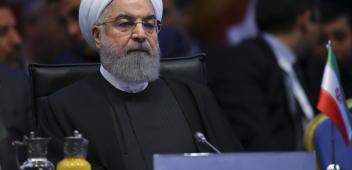Trump's goal is regime change
Originally published in the Australian Financial Review.

Donald Trump's decision to pull out of the Joint Comprehensive Plan of Action, like many of his decisions, have left us with more questions than answers.
What does Trump hope to accomplish by pulling the United States out of this hard-won deal? According to independent inspections by the International Atomic Energy Agency, Iran was abiding by the terms of the agreement, and not cheating as alleged in the Israeli prime minister's dramatic televised presentation. Major European allies, Trump's own Secretary of Defence, Israeli security officials, an overwhelming cadre of diplomats, and international relations experts urged Trump to stick to the deal, despite its shortcomings. Trump himself acknowledged in his televised address that the prospect of renegotiating terms is highly unlikely. So why did he do it?
If Trump's abrupt withdrawal from the deal (without a backup plan) was only about more effectively curtailing Iran's nuclear ambitions, then it was indeed a myopic decision, another example of his quest to destroy any Obama era achievements. But Trump's decision should not be understood in terms of what the nuclear accord is supposed to accomplish. Rather the decision should be understood in the context of what the accord does not encompass - regime change.
The desire to effect regime change in Iran is at the core of Trump's decision. It is an objective shared by his allies Israeli PM Netanyahu and Saudi Arabia Crown Prince Mohamed bin Salman. For them and Trump it was never about nuclear arms control – that is far too narrow a goal.
When Trump says it was a 'bad deal' he's not talking about the JPCOA's capacity to halt Iran's nuclear ambitions, he's talking about the fact that the theocratic Iranian regime continues to exist at all. The JCPOA does nothing to further Trump and his allies' primary objective of removing Iran's religious rulers and blunting Iran's regional power and the threat it poses to the US, Sunni Arab states and Israel. Worse, from Trump's perspective, the JCPOA actually props up the Iranian regime by easing the punishing economic sanctions that have threatened Iran's internal stability. Within that context, the decision to pull out of the JCPOA makes a lot more sense.
Halting Iran's nuclear program for the time being is not enough for Trump. Iran as an Islamic Republic, with the IRGC spearheading its ambitions for regional dominance, gunning for the elimination of the state of Israel and challenging Sunni Arab regional dominance is unacceptable to Trump and his allies, with or without nuclear weapons. Iran's nuclear ambitions are only a part of the larger concern over its strategic power and reach across the Middle East.
Pulling out the JCPOA frees Trump to pursue a policy of regime change by imposing and strengthening primary sanctions which he believes will eventually squeeze the mullahs out of power. He is betting that other signatory countries will not risk doing business in Iran because of secondary sanctions, and that Iran will not have the wherewithal to restart its nuclear program. The hope is that the economic vice will prompt a popular uprising against Iran's religious leaders.
Trump hasn't explicitly stated that this is the United States' new policy but given his current crop of advisors – new Secretary of State Pompeo and new National Security Adviser Bolton and his closest international allies – Netanyahu and MBS, all hardline advocates of regime change in Iran, it's a safe bet to assume that the desire to topple the Iranian regime is at the core of Trump's decision.
But pushing for regime change in Iran is dangerous thinking. Past efforts at regime change in Iran did not go well. Any Iranian can tell you about 1953, when the United States covertly supported a coup that overthrew the democratically elected Prime Minister Mohamed Mosaddegh and installed the dictatorial rule of the Shah. While the Shah remained a strong US ally during his reign, his excesses led to his own overthrow two and a half decades later through the Iranian Revolution in 1979 from which emerged the belligerent religious rule in Iran today.
If Trump and his allies insist on chasing after regime change, it could very well lead to another long train of unintended consequences. The decision to pull out of the JCPOA widens the wedge between the United States and its most important European allies potentially prompting a trade war and unprecedented escalation in trans-Atlantic tensions. In Iran, the regime will channel the Iranian public's disaffection with the economy externally, potentially strengthening hard line factions. Iran could also restart its nuclear program, prompting a more direct confrontation with Israel and Saudi Arabia and threatening a wider war in an already conflict-ridden region. We are already seeing the beginnings of this in the recent strikes in the Golan Heights. The United States' geopolitical competitors – China and Russia – will fill the trade void and will use it as a means to counter US interests in the region.
Alternately, the resumption of sanctions may work, the deal collapses, and the economic pressure is too much for the Iranian regime to withstand, leading to their overthrow. But what then? The last time the regime changed in Iran in 1979, the revolution created a power vacuum that hardliners deftly filled. There is no way to guarantee that moderates will win out.


